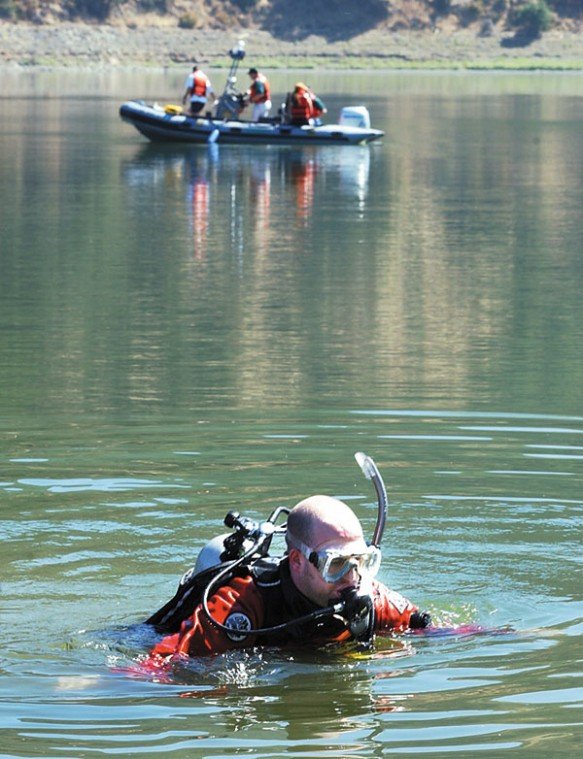Santa Clara County Sheriffs Special Operations train for search
and rescue missions
By Jessica Thy Nguyen Special to the Dispatch
Fishermen on Coyote Reservoir would have caught sight of something more interesting in the water Wednesday morning than a fish pulling on the end of their line.
It was the Santa Clara County Sheriff’s Special Operations Division, Underwater Search and Rescue Unit out with their diving suits and Zodiac boat training for search and rescue missions.
Lt. Dale Unger, commander of the unit, and most of the team were preparing for possible drowning situations where victims are difficult to locate.
“We average I would say, 15 calls out of the year,” Unger said. “The most recent was last Saturday at the Guadalupe Reservoir for an unoccupied submerged vehicle.” That turned out to be a stolen car.
The unit consists of 12 divers and three non-divers, mostly Sheriff’s deputies, and has been serving Santa Clara County and surrounding counties since 1964.
All the divers are certified and trained in rescue diving, and most of the team also are trained in underwater investigations while dealing with limited to zero visibility situations.
The unit’s mission and function are for water rescues, recovery of drowned victims, and the collection of submerged evidence such as vehicles, guns and stolen property. The majority of dives take place in lake scenarios, or black water, with zero visibility.
Unger has been with the team for 23 years and said they are mostly called out to locate submerged vehicles which have been dumped into lakes by thieves, similar to Saturday’s mission. There are many situations however, where the team has been called to help locate the bodies of drowned victims.
“I would say 1984 was one of the most active years for us,” Unger said. “There were 38 drowning cases. I’d say that 90 percent of the drownings that year were alcohol or drug related.”
There have been eight drownings throughout the county so far this year, Unger said. In each of the situations where the dive team is called, their main goal is to get to the location and retrieve the victim within the first 60 minutes after the drowning occurred.
The first 60 minutes, called the golden hour, is most crucial to the rescue process if the victim has drowned in cold water because it maximizes the chance of resuscitating the victim without causing any brain damage, Unger said.
An example of this would be a little girl who drowned in ice cold water and was retrieved after two hours. In this rare case, she was resuscitated and survived without brain damage.
Electronic equipment for the unit includes an inflatable, gray Zodiac boat, a new 900 kilohertz side scan sonar, dive van, and an underwater remotely operated vehicle, which can retrieve bodies and evidence from deeper locations that divers can’t get to.
The Santa Clara County Sheriff’s Office is one of three agencies in the entire state to have the 900 kilohertz side scan sonar, which has the ability to detect hand guns and smaller items of evidence at the bottom of a lake.
“A 900 kilohertz side scan sonar will pick up a gun,” Unger said. “The difference between 900 kilohertz and 600 kilohertz is similar to a large, powerful telescope and a cheap telescope.
The new sonar device was bought with the help of a Homeland Security grant that makes it an asset not only to the state of California but to the entire nation, Unger said.
The new technology provided by the sonar along with the underwater remote operated vehicle, allows items to be located without having the divers search blindly for victims.
The team is usually deployed in situations where a witness can pinpoint the exact location of the drowned victim. In cases where there are no good witnesses, it could take days to find the victim just by feel, Unger said.
Deputy Kristin Anderson has been diving since 1995 and became a part of the team in 2003. She is the only female diver in the unit.
“You can’t be afraid of confined spaces,” Anderson said of her experience with the unit. “And you can’t be afraid of the dark. Most of our diving is in black water and you can’t see anything in front of you.”
Anderson said she loves diving and joined the Sheriff’s Office mainly because they had a underwater rescue unit.
In order to become a part of the team, participants must pass a rigorous underwater test done blindfolded, to demonstrate their comfort level in black water situations.
To optimize rescue missions, Unger said it’s crucial for the team to be immediately notified of drowning victims.
“We’re now focusing on being more of a rescue unit [instead of a retrieval unit],” Unger said. “And getting to the body within that golden hour.”














